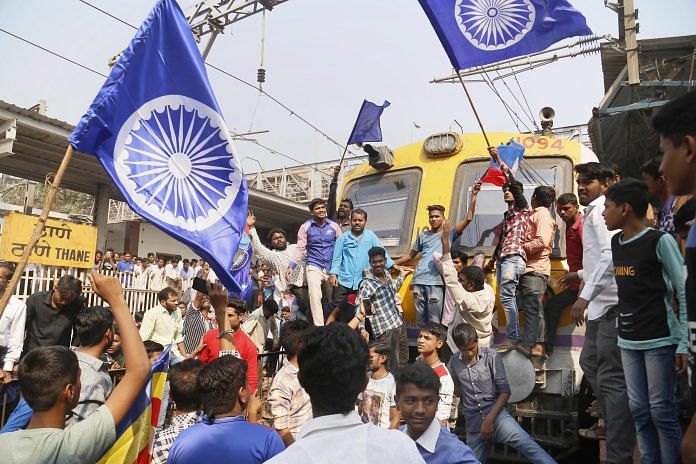To understand the life of Dalits, Indians need to be re-educated. The categories of Dalits as change-making rebels is the least apprehended terminology.
ThePrint is publishing articles on Dalit issues as part of Dalit History Month.
The Dalits do not exist in popular imagery as equals and thus they are not a part of our concern in our everyday lives. The semiotics of the Dalit in the larger so-called upper castes, or to put it more accurately, oppressor caste communities is that of street cleaners, manual scavengers, domestic workers, farm labourers, office workers. Their suffering is, in fact, normalised under a karmic theory at times.
To understand the life of Dalits, Indians and the world at large need to be re-educated. Currently, Indians are under-educated regarding Indian diversity and the cultural differences the nation harbours. The education system feeds the propaganda of caste supremacy. They misinform and downgrade the quality of vocational impulses. Thus, the education system needs to impart a Dalit perspective to learning.
Different identities of the Dalit
The categories of Dalits as change-making rebels is the least apprehended terminology.
In fact, the ‘radical Dalit’ is subverted and instead a docile and pitiable imagery is preferred. Therefore, the epistemology of the Dalit remains grossly under-studied and thereby less understood, further pushing for a lopsided analysis that discredits the Dalit.
The Dalits need to embrace this rebellious, radical category and work towards strengthening it. The revolutionary characterisation of Dalits as people who uproot the unequal social order by-any-means-necessary is the only option left for Dalits. Anything else will relegate the Dalit existence to the bad old days of untouchability.
Then there is the ‘angry Dalit‘. The vicious anti-Dalit forces and the state reservation measure arrogantly overlook the culture of segregation, mistreatment and violence imposed upon the Dalit bodies that result in enduring trauma. Until the Dalits assert and strike back on the moribund oppressive system, no one will take notice of the Dalit. By then, the Dalits will be branded ‘angry’ and even ‘violent’. The angry Dalit feels the grudges of enduring pain under its Brahminical oppressors.
The Dalit is an ‘urgent’ category, it is not passive and does not believe in slow progression. It believes in demanding, at times, snatching justice and not asking for it. It lives in the now moment and not in an imagined past or a fantasised future.
The Dalit is about the ‘panther’ that is calm and seeks justice. If you mess with it, don’t expect anything less than brutal. It is not going to convey the subservient salutation of johaar in the face of injustice and oppression. Instead, it is going to tear down the attacker to pieces. The Dalit is a loving community. But it also knows how to hate. It is angry. Its anger is unseen and is not in the purview of the terror-spewing Brahmins and its allied forces.
The Dalit is an ‘international’ identity. Its oppression under the neoliberal order co-relates to other oppressed groups around the world. The metaphors of Dalit citizenship have to wed with struggling groups across various geographies and issues—the immigrant groups, the oppressed people of Yemen, Syria, Palestine, people of colour, indigenous, the trans and queer communities, peasants of the global south who are fighting the global oppressive order. They have to take an active stand on the issues of the world’s oppressed communities. Until this internationalism is incorporated into its language, the Dalits will remain an unknown entity to the world. Like Indians overlook the Dalit lives, the world will remain oblivious to the Dalit struggles.
Waiting for Moses
The Dalits need to find autonomous ways of self-liberation. They need to actively take their future into their own hands. Awaiting for the emergence of an Ambedkar-like figure has become the best escape from real hard work. Many live with the hope that a Moses will emerge and lead them to freedom.
This hope has put their entire focus on suffering rather than concentrating on devising methods of liberation. The over-reliance on the state has punctured their sense of righteous being.
Unless they assert their being as equals aided with a strong force, they will continue to face improvised forms of caste rules emphasised by Manu’s legitimate babies.
Suraj Yengde is a W.E.B. Du Bois nonresident Fellow and a research associate with the Department of African and African American studies at Harvard University (@surajyengde)
Read more from ThePrint’s Dalit History Month archives.



